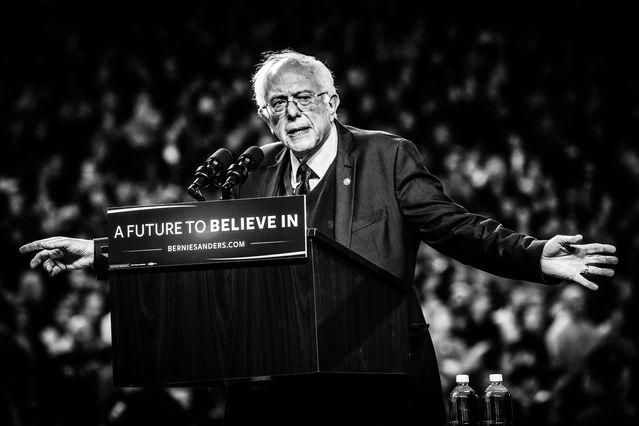 |
| Senator Bernie Sanders at a rally in Laramie, Wyo., on Tuesday. He won the state’s caucuses |
Continuing a string of victories across the West, Senator Bernie Sanders of Vermont won the Wyoming caucuses on Saturday, a symbolic triumph, if not a race-altering one, in the last Democratic contest before the April 19 New York primary.
Mr. Sanders beat Hillary Clinton statewide by about 11 percentage points, though the end result was effectively a tie, as each candidate took seven of Wyoming’s 14 pledged delegates, the fewest any state had to offer. Mrs. Clinton’s nationwide lead remained at 219.
But after Mr. Sanders’s recent big victories in Washington State, Alaska, Idaho, Utah, Hawaii and Wisconsin, it was more evidence of Mrs. Clinton’s weaknesses among white and liberal voters as the race moves to major primaries in New York and elsewhere in the Northeast.
“We just won Wyoming,” Mr. Sanders said, pausing unexpectedly while speaking at a rally at the LaGuardia Performing Arts Center in Queens.
His supporters leapt to their feet and gave him a standing ovation. He thanked Wyoming voters, but said with a smile, “There are probably more people in this room than there are in Wyoming.”
It was the only contest of the day for the Democrats. In Colorado, SenatorTed Cruz of Texas swept all of the state’s delegate elections, which ended on Saturday at the state Republican convention when he picked up the remaining 13, bringing his total there to 34.
Mr. Cruz, the only candidate to speak at the convention, received a rousing reception.
 |
| Republican delegates and their supporters cheered for Senator Ted Cruz of Texas as he spoke at the Colorado Republican State Assembly in Colorado Springs on Saturday. |
“The real question is: Do you understand the principles and values that made America great in the first place?” he said, taking a jab at his rival, Donald J. Trump, whose organization struggled with the most basic tasks in Colorado, such as printing the right delegate names next to the right ballot numbers on the lists of preferred candidates that Trump volunteers distributed on Saturday.
Like Mr. Sanders, Mr. Cruz still trails the front-runner in his race, Mr. Trump. And the campaign now moves to territory likely to be far more favorable to Mr. Trump.
Though Mr. Sanders was favored in the Wyoming Democratic race, Mrs. Clinton had endorsements from more elected officials, as she does in most states, and the state’s four superdelegates are supporting her. In 2008, she lost to Barack Obama in Wyoming by 24 percentage points.
The contest was exactly the type she struggles in. It is mostly white, and it uses a caucus format. Mrs. Clinton did not campaign in Wyoming, choosing instead to devote time and resources to delegate-rich New York and Pennsylvania, which holds its primary April 26.
President Bill Clinton did appear on his wife’s behalf. On a stop in Cheyenne, he talked about the need for clean energy and a transition away from coal and other fossil fuels, as 500 Wyoming coal workers faced being laid off. A protester outside held a sign that read, “God, guns and coal made America great.”
Mr. Clinton spoke about the layoffs. “Just think about the jobs that would be created in Wyoming if we decided to maximize your capacity to export wind as you export coal,” he said.
The former president seemed acutely aware of his wife’s chances in the state. “There are a lot of young college students who have been very enthusiastic about her opponent because he promises free tuition for everyone,” he said. (Mr. Sanders has proposed free tuition at public colleges.)
“If you read the fine print,” he said, “the free tuition comes two-thirds from the federal government and one-third from the state.” He said it was unrealistic to expect the state’s Republican governor and Legislature to support the program.
Mr. Sanders showed up in Wyoming, holding a rally Tuesday in Laramie, where he delivered his victory speech after winning the Wisconsin primary.
“I believe we have an excellent chance to win New York and a lot of delegates in that state,” Mr. Sanders said in Laramie.
Referring to his large deficit among superdelegates, the party leaders and elected officials who have overwhelmingly backed Mrs. Clinton, but who could still change their minds, he said: “I think a lot of these superdelegates are going to be looking around them. And they are going to be saying, ‘Which candidate has the momentum?’ ”
James King, a political-science professor at the University of Wyoming, said the state was a good fit for Mr. Sanders. “He really has to, I think, at each success build on another success, and he is running out of states, obviously,” Professor King said.
Mr. Sanders’s missives about a corporate-driven political system touched a nerve among Wyoming voters like John Hess, a 28-year-old veteran who spoke up for Mr. Sanders at Sheridan County’s caucus and sounded not unlike the candidate himself.
“How can an average working citizen make an informed decision about health care,” he asked, “when the for-profit health services industry is blasting ideals on your TV and radio that support their own profits over ideals that would increase the effectiveness and efficiency of the health care industry?”
Mrs. Clinton received a handful more votes than Mr. Sanders did in that caucus, held at the Sheridan County Fairgrounds exhibit hall, the site of many local 4-H and rodeo competitions in an area bracketed by the Bighorn Mountains to the west and vast open spaces to the east.
“We live in a very complex world, internationally and nationally, and we need a representative for our country who has the kind of experience and understanding of that complexity,” Michelle Sullivan, a daughter of former Gov. Mike Sullivan, said as she spoke up for Mrs. Clinton. “I think she has that.”


